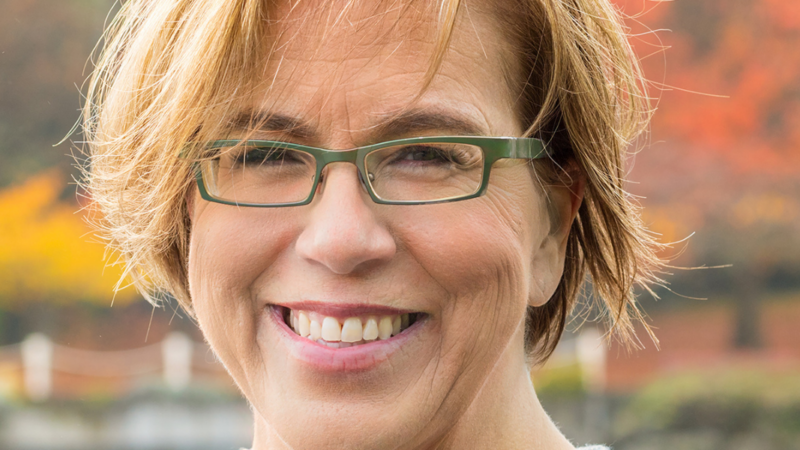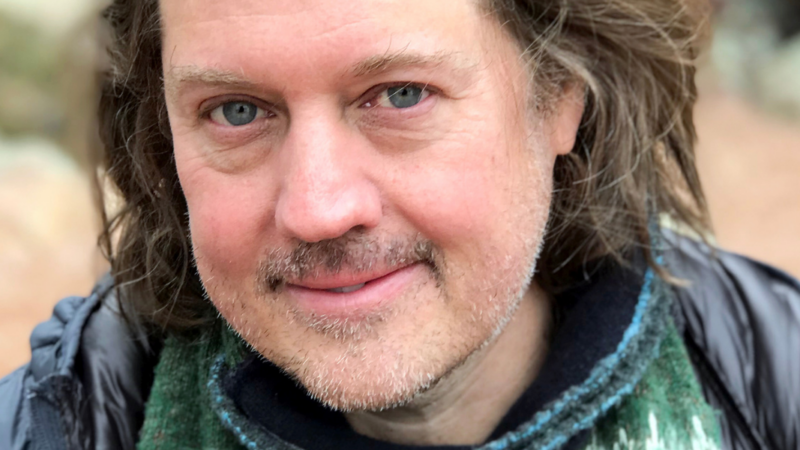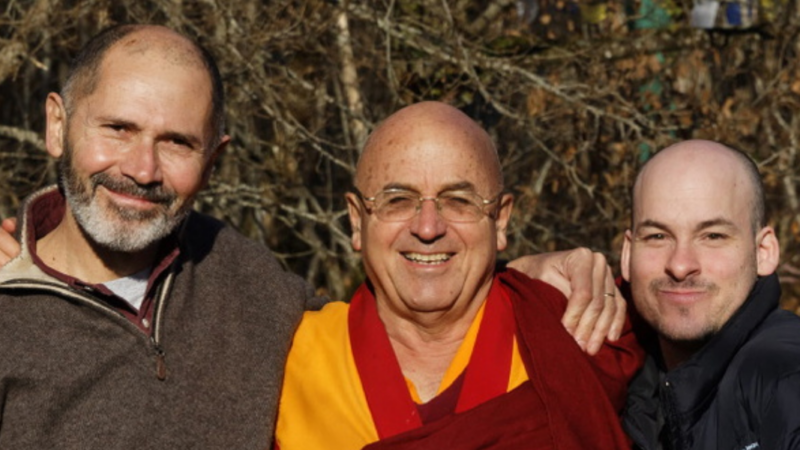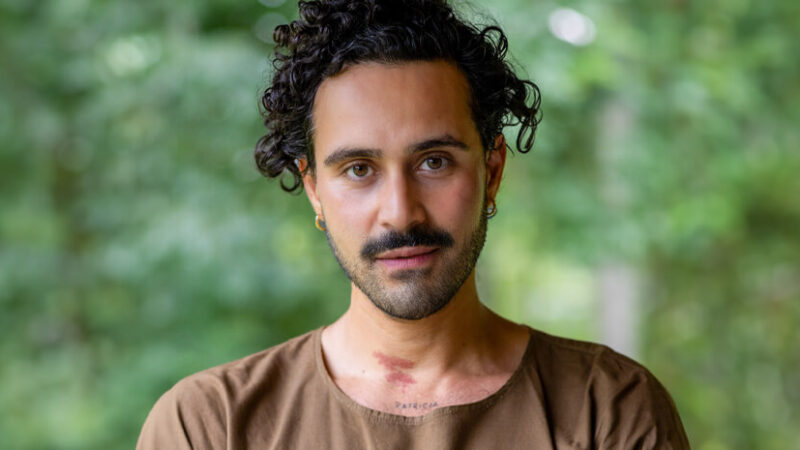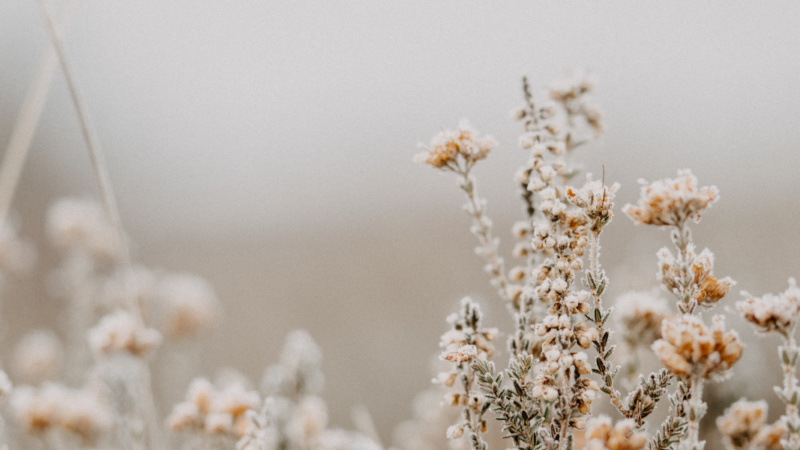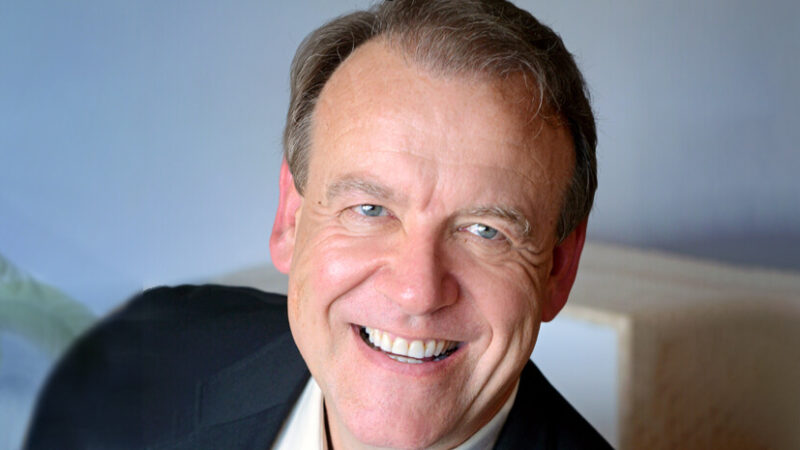-
E90: How to Stop Minding and Start Living
Michael Singer — June 29, 2025
“Do you mind?” We “mind” everything, from traffic to childhood memories, and this habitual...
-
Cyndi Dale: Becoming Your Own Best Ancestor
Cyndi Dale — July 1, 2025
On the surface, it appears as though the lives we live proceed forward moment by moment in a...
-
Honey Tasting Meditation: Build Your Relationship with Sweetness
There is a saying that goes “hurt people hurt people.” I believe this to be true. We have been...
Written by:
Amy Burtaine, Michelle Cassandra Johnson
-
Many Voices, One Journey
The Sounds True Blog
Insights, reflections, and practices from Sounds True teachers, authors, staff, and more. Have a look—to find some inspiration and wisdom for uplifting your day.
Standing Together, and Stepping Up
Written By:
Tami Simon -
The Michael Singer Podcast
Your Highest Intention: Self-Realization
Michael Singer discusses intention—"perhaps the deepest thing we can talk about"—and the path to self-realization.
This Week:
E90: How to Stop Minding and Start Living -
Many Voices, One Journey
The Sounds True Blog
Insights, reflections, and practices from Sounds True teachers, authors, staff, and more. Have a look—to find some inspiration and wisdom for uplifting your day.
Take Your Inner Child on Playdates
Written By:
Megan Sherer
600 Podcasts and Counting...
Subscribe to Insights at the Edge to hear all of Tami's interviews (transcripts available, too!), featuring Eckhart Tolle, Caroline Myss, Tara Brach, Jack Kornfield, Adyashanti, and many more.
Most Recent
Meet the author of . . . P.S. I Love You More Than Tun...
The Author
Sarah Chauncey is the coauthor of P.S. I Love You More Than Tuna along with illustrator, Francis Tremblay, coming October, 2020. She has written and edited for nearly every medium over the past three decades, from print to television to digital. Her writing has been featured on EckhartTolle.com and Modern Loss, as well as in Lion’s Roar and Canadian Living. She lives on Vancouver Island in British Columbia, where she divides her time between writing, editing nonfiction, and walking in nature. Learn more at sarahchauncey.com.
The Book
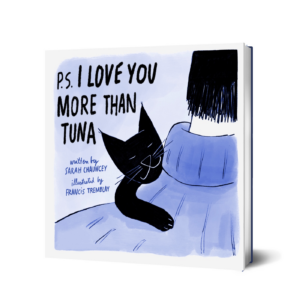
Our cats occupy a unique space in our hearts. When they’re gone, the loss can be devastating, the grief profound.
P.S. I Love You More Than Tuna gives us an opportunity to give friends, loved ones, or ourselves tangible comfort during the grieving period, when so many of us feel isolated and misunderstood after a beloved pet dies.
Send us a photo of your sacred space.
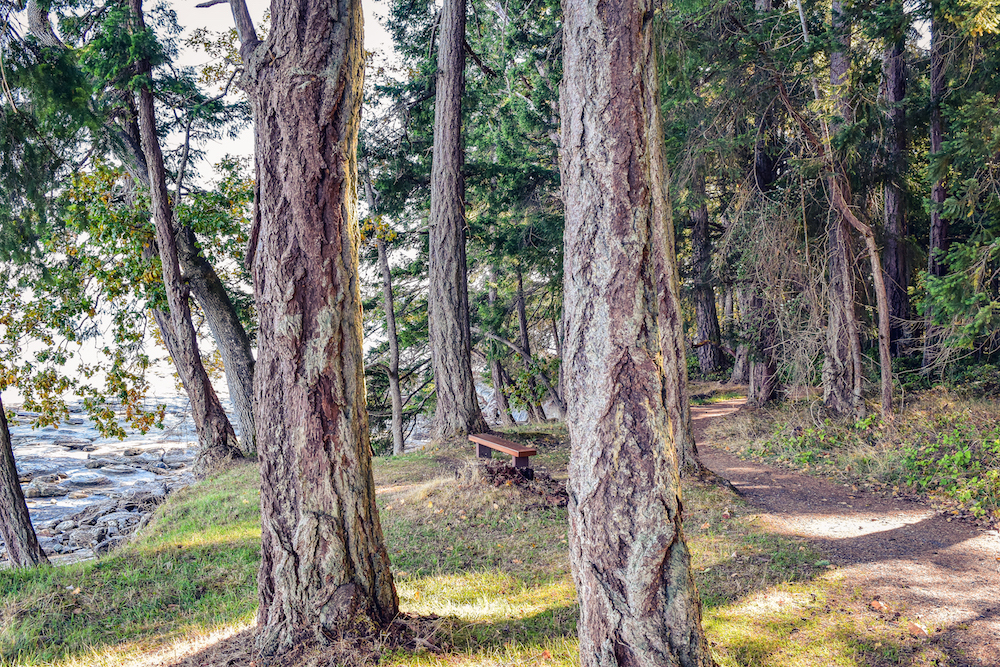
First Nation, Saysutshun Newcastle Island is an ancient forest and marine provincial park. Saysutshun, I’m told, means “training or preparation ground,” and indeed, for millennia before colonization, the Snuneymuxw brought healers to this small island to train “mentally, physically, and spiritually.” I knew none of this history when I first began walking long stretches of the uninhabited island’s 13.6 miles of trails. I only knew that the island seemed to lift away anything that wasn’t essential, easing my mind and making way for creative ideas to flow. I’d walk a bit, then sit and meditate, write for a while, then walk some more. This bench, under a circle of seven trees, became my favorite writing and meditation spot. The moss-covered trees became my friends, teaching me to stay rooted when things around me change. As I wrote in a 2016 essay about the island, “I have become a literal tree-hugger, and even—when nobody is looking—a tree-kisser.”
What was your favorite book as a child?
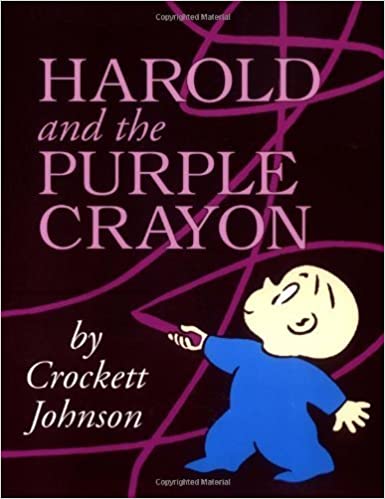
I was a total bookworm as a child. Instead of playing games at recess, I preferred to curl up under my desk and read. Of all the books I read—from every Encyclopedia Brown to Freaky Friday to The Short Stories of Ernest Hemingway (I was a precocious kid), the book with the most enduring impact was also the simplest: Harold and the Purple Crayon. I was enchanted by Harold’s adventures, amazed by his ability to draw his way out of every obstacle and ultimately find his way home. Long before I began seeing this as a metaphor for creativity (and life!), this story appealed to me. Fifty years later, I continue to find new layers of meaning in this little book. It’s a simple yet profound testament to the power of imagination and creativity.
What is one unexpected thing or habit that inspires your writing practice?
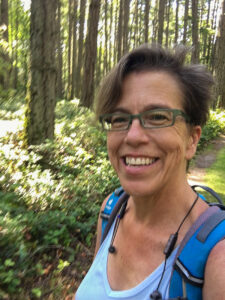
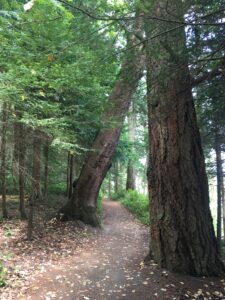
Walking in nature is my creative “secret sauce” and the central practice to my writing. Several years ago, I realized that although my role in this world is as a writer, my job is to bring myself back into presence, over and over, to get into a place where words can flow through me. I walk to get out of my mind and into my body. I come into fierce presence by noticing the rain on my face, salal berries ripening into deep blue, or the texture of earth beneath my feet. When my body is occupied by walking, ideas bubble up from my subconscious. Whether I’m looking for ways to trim an over-long essay or searching for words to evoke a hard-to-articulate experience, as soon as my legs find their rhythm, ideas begin to flow.
Learn More

Sounds True | Amazon | Barnes&Noble | Bookshop | Indiebound
Meet the Author of . . . A Healing Space
The Author
Matt Licata, PhD, is the author of A Healing Space: Befriending Ourselves in Difficult Times, coming out in November, 2020. In addition to being an author, he is a practicing psychotherapist and hosts in-person retreats. His work incorporates developmental, psychoanalytic, and depth psychologies, as well as contemplative, meditative, and mindfulness-based approaches for transformation and healing. He co-facilitates a monthly online membership community called Befriending Yourself, is author of The Path Is Everywhere, and is the creator of the blog A Healing Space. He lives in Boulder, Colorado. For more, visit mattlicataphd.com.
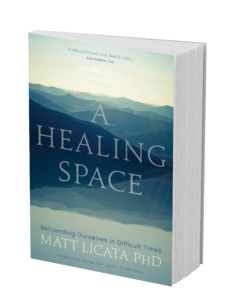
The Book
Is healing a matter of solving a problem, curing a sickness, or making our wounds disappear? “In my experience,” writes depth psychotherapist and meditation teacher Matt Licata, “true healing is not a state where we become liberated from uncomfortable feelings, but one in which we are free and flexible to welcome our complete experience—whether happy or difficult—more fully.” With A Healing Space, Dr. Licata invites us to explore a more vital sense of wellness—one that does not put us in opposition to life’s hardship, but instead welcomes all experience as part of the soul’s majestic vastness.
Are you learning any new tricks or skills during this time (COVID)? Has your book taken on a new meaning in the world’s current circumstances? Is there anything you would have included in your book if you were writing it now?
One thing I’ve been struck by in this time of COVID is just how formative, powerful, and challenging solitude can be for each of us, and how through confronting our aloneness we will inevitably meet parts of ourselves that we had lost contact with in times of status quo. As relational beings, wired to connect and co-regulate with one another, it can be so counter-instinctive to be alone, for there to be an absence of “good others” in our lives, and how much we take this for granted.
What has become a lot clearer to me is how we can call on these “internal others” who, through many moments of kindness, attunement, empathy, and compassion, reside as an “internal network” within us, and how important this can be in times of physical separation—and how truly available they are, even from afar, in ways that might surprise us.
I’m happy that A Healing Space is coming out during this time as it is centered around the art and practice of “befriending” and what that might mean in our contemporary world. Had I known that we would be sheltering in place and social distancing as we are, I would have more explicitly addressed the unique ways that isolation, solitude, and even loneliness can serve as actual allies on the path of awakening and healing, portals or doorways to a more merciful, wise, and compassionate relationship with ourselves and others.
What is one unexpected thing or habit that inspires your writing practice?
So much of my writing comes out of conversations I have with others—friends, family, students, clients, and even strangers. I often find myself deeply curious and even in awe at how others find meaning in their experience, make sense of it, and organize it in ways that are similar—and also at times quite different—to my own.
There’s something about being in conversation that opens me to another person’s heart, to their soul, to their psyche, and I often leave a conversation with new ideas, lenses, or reality tunnels, which I tend to explore via image and language.
It’s sometimes not easy for me to “sit down and write” in a general and abstract way. It requires live interaction with another human being or with the natural world in order to flow. It’s almost like I wait to hear a certain whisper or inner song that arises from conversation and quickly scramble to be the scribe for that to come into the world.
If there is a book that started your spiritual journey, what was it? How old were you, and how did you discover it? How would you describe its impact?

The first overt “spiritual” book I remember reading was in my senior year of high school: The Razor’s Edge, by W. Somerset Maugham. I would have been 17 at the time and had always been a bit of a dreamer with a vivid imagination and deep curiosity and wonder as to whether I really belonged in this place.
It was an identification with the protagonist, Larry Darrell, that catalyzed a certain longing in me, a knowing that there was more to this life than it appeared. To this day, I can return to some of those feelings I felt at the time, an opening or crack in reality, you might say, that invited me into a life of deeper meaning, magic, and aliveness.
I reread the book while traveling in India in my early 20s and continued my connection with Maugham and with Darrell, especially with Larry’s journeys in India himself. I had a kindred spirit out there somewhere and I remember that meaning a lot to me at the time, that there was at least one other person who wondered and wandered in the same way that I did.

Learn More
Sounds True | Amazon | Barnes&Noble | Bookshop | Indiebound
Meet a Coauthor of . . . Freedom for All of Us
The Author
Christophe André is a psychiatrist specializing in the psychology of emotions. His books include Imperfect, Free, and Happy, and Meditating, Day after Day. He lives in France. For more, visit christopheandre.com.
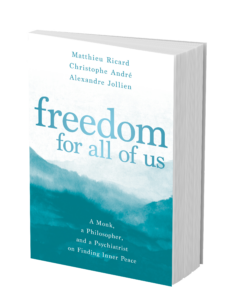
The Book
With their acclaimed book In Search of Wisdom, three gifted friends—a monk, a philosopher, and a psychiatrist—shed light on our universal quest for meaning, purpose, and understanding. Now, in this new in-depth offering, they invite us to tend to the garden of our true nature: freedom.
Filled with unexpected insights and specific strategies, Freedom for All of Us presents an inspiring guide for breaking free of the unconscious walls that confine us.
Translated from the original responses in French.
Send us a photo of your sacred space or workspace.
Here is the view from my home office in Saint-Malo, Brittany, France. My writing space is situated on the top-most floor of the house, just underneath our roof, and each time I lift my head to look out the window, I see the beach, the ocean, and, further away, the ramparts of the old city. The ever-changing nature [of this place], the sky and the tides forever moving (and morphing), the memory of all the corsairs (pirates) of Saint-Malo’s past … all of these things are what inspire me and bring joy to my life.
What is something about you that doesn’t make it into your author bio? It could be something that impacts your work, or something totally random and entertaining!
[There’s] nothing necessarily odd or extraordinary, but perhaps a rather banal fact [is my] being a parent. For me, becoming a father is the event that has most changed me in my life (and has most encouraged me to better myself). It has truly enriched my life the most.
There are two key moments (or memories) that for me [define] being a parent. Firstly, those moments where we realize our children are watching and judging us; and this moment can be very moving and also uncomfortable as a parent, because you feel like your children have discovered all your limits or your faults. (How can we hide it? Impossible, they will see them! At least once, or from time to time.) The essential lesson is that we don’t try to constantly hide our true selves, and this encourages us to transform ourselves. The watchful eye and judgments of our children can feel like a challenge for parents, but a fruitful challenge [nonetheless].
The other key moment is when we realize that our children are more skilled in ways we are not (and sometimes in all ways)! It’s that moment when we discover that we, as parents, are learning from our children; their intelligence, generosity, and enthusiasm. It’s the moment that we allow ourselves, discreetly and with great humility, to let them be our teachers.
If you could invite any three transformational leaders or spiritual teachers (throughout time) to dinner, who would they be and why?
I imagine I would probably be too intimidated to actually have dinner or a conversation with the following three people! I would probably prefer to follow them, like a shadow or a small mouse, and to watch them live and work over several days. To observe their intimate, everyday routines, and listen to their discourse (which in a way is possible with all of their published works). It has always seemed to me that wisdom arises, above all, through example and embodiment.
I would love to follow the everyday life of Etty Hillesum, [the writer], who was a stranger to hatred. Even when she would have every reason to hate the Nazis, who had her executed [at Auschwitz], she still spoke of grace even in a world where only fear, violence, and injustice seemed to live.
I would love to follow alongside Rev. Martin Luther King Jr. during a day in his life. I admire him for his choice to fight for civil rights without the use of violence. I remember, vividly, crying when I visited his memorial in Atlanta.
And finally, I would love to shadow Henry David Thoreau when he was living in his cabin at Walden. I admire his decision to live a life filled with only the essentials: nature, spirituality, and few material possessions, which is in stark contrast to the mistakes and values that we hold in this modern day.

Learn More
Sounds True | Amazon | Barnes & Noble | Bookshop | IndieBound
Customer Favorites
Sah D’Simone: Spiritually, We
Friendship is a vital need. Without caring connections with others, we suffer physically, psychologically, and spiritually. In his new book, Spiritually, We, Sah D’Simone shares a collection of teachings, stories, practices, and techniques to “open ourselves to the dance” of relationship and help end the epidemic of loneliness in our time.
Enjoy Tami Simon’s conversation with the uniquely savvy and always sassy Sah, as they discuss: cultivating friendships that hold and carry you; transformation through trauma; Somatic Activated Healing® and its application with heartbreak; letting go of our stories and coming into our feelings; freedom from conditioning; discovering your “unstruck goodness”; practicing radical friendliness with everyone; the Spiritually, We liberatory equation; healing through community; shifting from intellectualization to embodied insight; the foundational step—taking personal responsibility; inviting people into your inner world; the power of presence; punitive justice vs. restorative justice; social integration; why “connection is the cure”; and more.
Note: This episode originally aired on Sounds True One, where these special episodes of Insights at the Edge are available to watch live on video and with exclusive access to Q&As with our guests. Learn more at join.soundstrue.com.
The Importance of Being Vulnerable
Emotions are the primary way we connect with others. In fact, for all the ways we perceive that sharing our emotions causes trouble, it’s actually worse for us not to. Sharing our truest, most vulnerable selves actually prevents us from the isolation that occurs when we miss out on the deep connection that only comes from this type of transparency. While social media can be a place of great support, it’s also caused a huge challenge. Because we’ve created a world in which we are addicted to showing our curated emotions, social media posts rarely tell the entire story. We’ve gotten accustomed to holding back our real selves—so much, in fact, that we have a totally distorted view of what’s “real.”
On a wet fall day as I was researching the negative effects of social media for this book, I noticed that a heavy sense of melancholy had fallen over me. Pushing myself to go out for a short walk in my beloved Central Park, only a block away, took every ounce of energy I had. When I was out, my sadness didn’t fade, but astounded by the colorful change of leaves, I felt inspired to take a handful of photos. They were the kind that Instagram is made of. When I got home, I decided to post them on social media. But earlier that day I had read something that was still with me: what happened when Tracy Clayton, host of the BuzzFeed podcast Another Round, asked people to repost photos they’d previously shared on social media, but this time, with the “real story” behind them. The photos that most of us would have longed for had painful stories behind them. One woman admitted to a terrible anxiety attack that took her all day to overcome, someone else shared the grief over a loss of a loved one stuffed under their smile at a party, and so on. What this shows us is that we are all running after a farce. But what’s worse, it shows that we’re all co-creating it.
So after a brief pause, I posted my gorgeous fall photos from the park with this: Full disclosure: Inspired by research for my next book about how social media posts screw us up by making everything and everyone seem OK even when they are not, I’m adding the truth here. These pictures were taken on a walk I dragged myself on because I felt sad today for no particular reason (except for that life is a lot sometimes).
I am typically not a sad person, nor am I one who shares it on social media when I am. I am very transparent on my author account, but for some reason, I am less so on my personal page. The response that day when I shared how I really felt took me by great surprise. Dozens of people I rarely heard from came out of the blue with comments, texts, and private messages. And what most of them were saying was, “I feel that way too.” In our technological age, we are more connected than ever before, but also lonelier and more isolated than ever before. I wondered that day, What if everyone stopped staying so busy pretending everything was perfect? What if instead of hiding our vulnerabilities to prevent the isolation we fear, we are driving it?
The bottom line is that, over and over again, I’ve learned that emotions are better in every way when they aren’t kept inside and to myself.
This is an excerpt from How to Heal Yourself From Depression When No One Else Can: A Self-Guided Program to Stop Feeling Like Sh*t by Amy B. Scher.
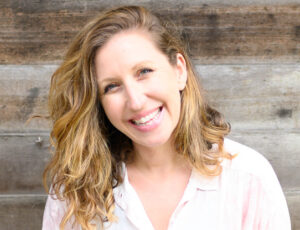 Amy B. Scher is an energy therapist, expert in mind-body healing, and the bestselling author of How to Heal Yourself When No One Else Can and How to Heal Yourself from Anxiety When No One Else Can. She has been featured in the Times of India, CNN, HuffPost, CBS, the Washington Post, Cosmopolitan, the Los Angeles Review of Books, Curve magazine, and San Francisco Book Review. Scher was also named one of the Advocate’s “40 Under 40.” She lives in New York City. For more, visit amybscher.com.
Amy B. Scher is an energy therapist, expert in mind-body healing, and the bestselling author of How to Heal Yourself When No One Else Can and How to Heal Yourself from Anxiety When No One Else Can. She has been featured in the Times of India, CNN, HuffPost, CBS, the Washington Post, Cosmopolitan, the Los Angeles Review of Books, Curve magazine, and San Francisco Book Review. Scher was also named one of the Advocate’s “40 Under 40.” She lives in New York City. For more, visit amybscher.com.
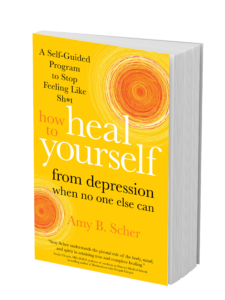
Learn More
Sounds True | Amazon | Barnes & Noble | Indiebound | Bookshop
The Surprising Power of EFT (Emotional Freedom Techniq...
In this podcast, Tami Simon speaks with Dr. Dawson Church about Emotional Freedom Techniques (EFT) and the technique known as “tapping”—and its amazing efficacy in trauma healing and post-traumatic growth. Tune in to this hope-giving, possibility-expanding conversation that explores bringing energy therapies into mainstream primary care, the proven effects of tapping acupuncture meridians to calm limbic activity, the history of tapping and the steps involved in practice, the importance of self-acceptance, avoiding retraumatization through memory reconsolidation and emotional extinction, the impacts that tapping has on our brain waves and sleep patterns, resilience and post-traumatic growth, meditation practice and the experience of “bliss brain,” the power of compassion, and much more.
